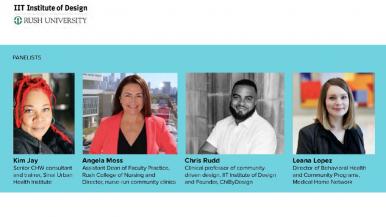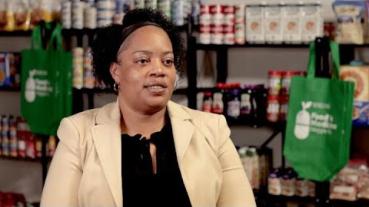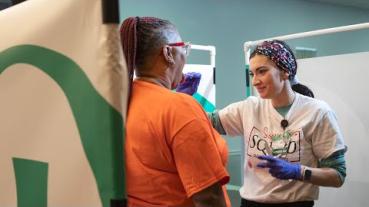People who bring health care to the underserved and those who design community-centered solutions to social problems recently came together online to address the need for equitable primary care in Chicago’s most at-risk communities.
The Equitable Primary Care in the Community Virtual Summit was held Sept. 28 to address the inequity embedded in how health care is delivered — an especially urgent and complex problem on Chicago’s West and South sides, where Rush University Medical Center and the IIT Institute of Design are located, respectively. The Graduate College of Rush University and the ID Action Lab are collaborating on an innovative, community-centered approach to refining a health care model focused on equity.
“There are some pretty major gaps in our health care system, the way it's designed,” said Angela Moss, PhD, APN, one of the four summit panelists. The issues range from payment structures that hinder access to care and limit the time spent with patients to systemic racism and mistrust, she said.
“The system needs to be disrupted at every step,” Moss added. “[Primary care] should be different, it should happen in different places, and providers need to be educated differently.”
Moss, director of Rush University Medical Center’s nurse-managed community clinics, and fellow panelists Kim Jay, senior community health worker consultant and trainer, Sinai Urban Health Institute, and Leana Lopez, LCSW, director of behavioral health and community programs, Medical Home Network, detailed some of the challenges they’ve experienced first-hand in providing care to those in need on the South and West sides. They were joined by Chris Rudd, clinical professor of community-driven design, IIT Institute of Design, and founder of ChiByDesign, a human-centered design firm.
The summit launched the partnership between Rush and IIT. The co-directors of the collaboration moderated the panel: Kim Erwin, MDesign, associate research professor at IIT Institute of Design, and Santosh Basapur, PhD, director of design at Rush University and assistant professor in the Graduate College.
“Design is a powerful tool in the hands of community residents,” said Rudd, who shared lessons from his work empowering residents of Chicago’s Bronzeville neighborhood. He emphasized the need to respect the time and expertise of community members and the need to create anti-racist solutions.
“Racism is the main thing we have to address if we’re going to think about an equitable future in health care, energy and education,” he said. “This is the crux of inequity in our system.”
The need to address racism and rebuild trust was a common theme raised by the panelists.
“When we think about why there is this resistance, especially in the black and brown communities, we think about the things that our parents told us about how people of color were mistreated, how they were disregarded, how their input was not taken into consideration,” Jay said.
As a community health care worker, Jay sees people in their home environment and witnesses the disconnect between those providing the care and those receiving it — and the historic mistrust that hinders that relationship.
“We have to really change our approach in how we connect with patients,” Jay said. Too often, patients are afraid to ask questions, and so they decide they will try to figure out what the nurses and doctors told them once they get home.
“If I could change one thing, it would be the education process,” Jay said. If health care professionals learned cultural humility and had a broad understanding of human experience, “that could address some of the racism and some of the stigma,” she added.
Like Jay, Lopez sees the need for more communication and understanding across the continuum of care. Medical Home Network, a non-profit that formed a provider-owned Medicaid accountable care organization called MHN ACO, works directly with federally qualified health centers to bridge the gap between primary care and other health care entities and community organizations.
“Our model is to embed nurses, social workers and community health workers into the health centers, right in the primary care setting, to give the providers more reach and more ways to engage patients in their community,” Lopez said. Then, they provide patients with a health assessment. In addition to screening for chronic conditions, health risk factors and substance use, the assessment includes screening for social determinants, the conditions and environments that affect one’s health.
“We're finding these patients who maybe haven't previously engaged in primary care before and trying to pull them into the health centers,” she said. “And like everyone else, our staff is trying to figure out how we can address those social needs,” including housing, food, medication, utilities and transportation.
State Sen. Mattie Hunter (Illinois-Third District), opened the discussion on “how to design primary care that communities understand, trust and will use."
“We know that primary care is essential for better health and equity, however, primary care is under-utilized by the very people who need it most,” Hunter said. “This is a systems design problem. … I am confident that the Rush-IIT collaboration will make real progress towards equitable, people-centered care.”
You can watch a recording of the summit on YouTube.
As part of the Rush-IIT multi-year collaboration, the graduate schools at ID and Rush University will offer courses, seminars and events in the coming months for students, clinicians, and executives.
Read more about the IIT-Rush collaboration and sign up to receive updates.




